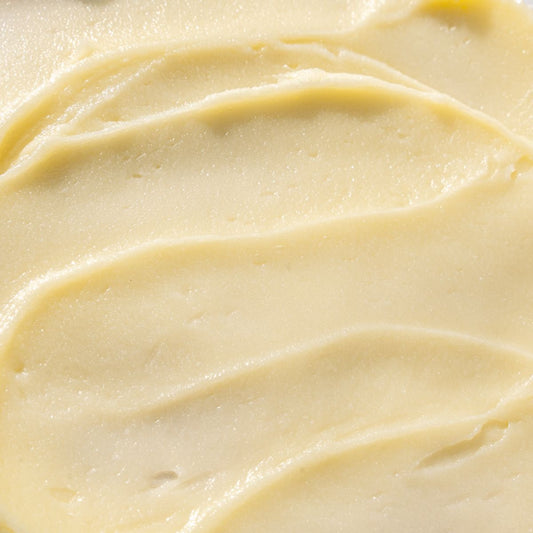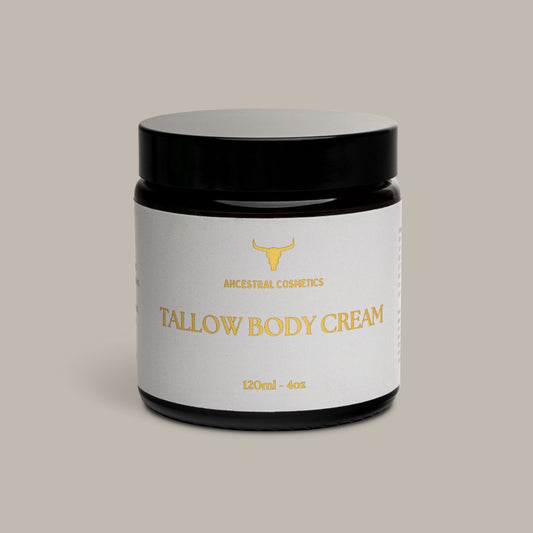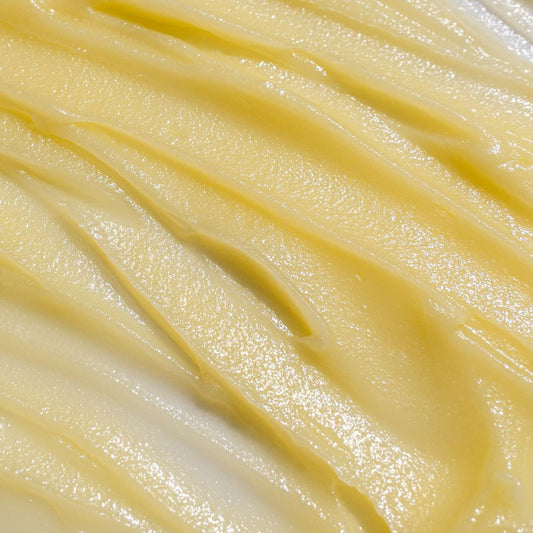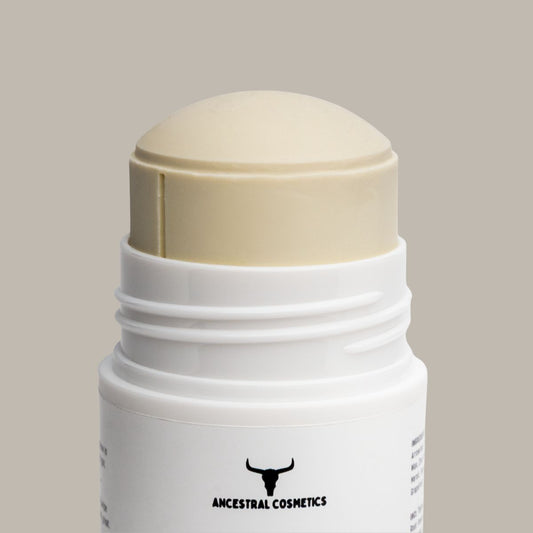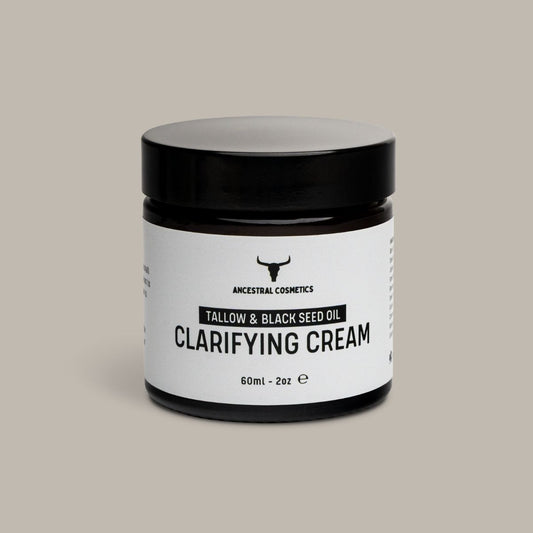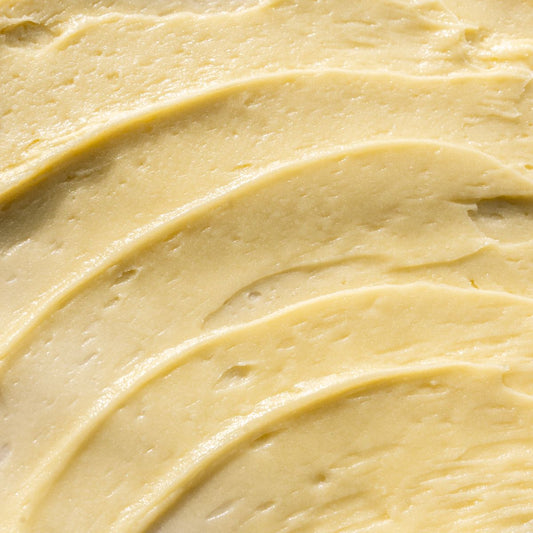In the growing wave of awareness about what we put on—and into—our bodies, the debate around seed oils has sparked an anti-seed oil movement.
And while there are nuances to every public debate like this, a large majority of people, without diving into the details, just make a simple conclusion: all seed oils are bad.
But this couldn't be further from the truth.
In this article, we'll explain why and how we approach the seed oils here at Ancestral Cosmetics.
Our ancestors extracted and used seed oils for thousands of years. But they do so in a simple and somewhat primitive way- by crushing the seeds with a heavy rock, a process that's known today as cold-pressing.

History of seed oils
The extraction of oils from seeds on a significant scale began in the late 19th and early 20th centuries, driven by industrialization and innovations in machinery that allowed for high-heat and solvent-based extraction processes.
For example, cottonseed oil was one of the first seed oils used industrially.
Initially considered a waste product in cotton production, cottonseed oil became commercially viable in the 1880s due to advancements in refining technology. Procter & Gamble’s development of hydrogenated cottonseed oil in 1911 led to Crisco, the first commercially produced vegetable shortening.
The broader adoption of soybean, canola, sunflower, and other seed oils followed in the mid-20th century. Due to large-scale farming and efficient extraction methods, including hexane extraction, these oils became popular for their low cost, long shelf life, and high yield. This allowed them to replace traditional fats in cooking and become widely used in processed foods by the 1960s and 1970s.
Crops like soy, rapeseed (canola) and sunflower are heavily subsidized by governments worldwide, making them a crop of choice for many farmers, because they don't need to worry if they will sell and for what price when the government guarantees this. Easy money.
In skincare, these oils were introduced more recently, with the rise of Big Beauty looking for ever cheaper ingredients for their creams and lotions.
Cold-pressed oils like castor and black seed oil, however, have roots in ancient skincare and medicinal practices dating back thousands of years in Egypt, Greece, and Persia, prized for their healing and moisturizing properties.
Around 3000 BCE, Egyptians began cold-pressing oils from seeds such as sesame and castor.
Castor oil, in particular, was valued for its medicinal properties and used as a base for ointments and cosmetics, as well as a lamp fuel. Ancient texts detail the extraction and medicinal applications of castor oil, suggesting that Egyptians mastered the method of pressing without high heat, preserving the beneficial compounds within the oil.

The people of ancient Mesopotamia, around 2500 BCE, are also known to have used sesame oil, which was likely cold-pressed using early stone presses. This oil was essential in cooking and in religious ceremonies, symbolizing sustenance and abundance.
The Greeks and Romans, by 200 BCE, utilized cold-press techniques for both olive and certain seed oils. Olive oil was the primary oil, pressed with low heat from olives, but flaxseed oil and sesame oil were also occasionally cold-pressed. Greek physicians and philosophers, such as Hippocrates, recorded the health benefits of these oils for both internal and topical use.
The use of black seed oil dates back to ancient Egypt, where it was found in the tomb of the Egyptian pharaoh Tutankhamun (dating to around 1324 BCE). Ancient Egyptians valued black seed oil as a beauty and health remedy, often using it to protect the skin from environmental damage. Cleopatra and Nefertiti are said to have included black seed oil in their skincare rituals for their reputed skin-nourishing properties.

Modern seed oils
In the modern age, highly processed seed oils, like soy, canola, and sunflower oils, are extracted through high-temperature methods, often with the help of hexane—a petroleum-based solvent—to increase yields.
This hexane-based extraction process, combined with additional bleaching and deodorizing steps, often removes beneficial compounds and introduces residues that aren’t always friendly to skin health.
Hexane, for instance, has been shown to leave trace residues in oils, and prolonged exposure may impact skin barrier function. High-heat deodorizing and bleaching strip oils of antioxidants and fatty acids that naturally nourish and protect the skin, leaving a more "refined" but less beneficial oil.
The Good Seeds: Castor Oil, Black Seed Oil, and Cold-Pressed Oils
Contrast this with oils that undergo minimal processing. Cold-pressed oils, like olive oil, are extracted without heat or solvents, preserving antioxidants, vitamins, and fatty acids essential for skin health.
Similarly, black seed oil (Nigella sativa) and castor oil also retain potent anti-inflammatory and antimicrobial compounds, supporting their traditional uses in healing wounds, reducing redness, and soothing irritated skin.
These oils are rich in antioxidants and unique compounds like thymoquinone in black seed oil, which supports skin resilience against environmental stressors, while castor oil’s ricinoleic acid has been found to support hydration and microbial balance.

The Chemical Processing of Modern Seed Oils
The production of highly processed seed oils involves several steps, including the use of chemical solvents, high-temperature deodorization, and bleaching. Each of these processes can diminish the natural quality of the oil, impacting its benefits for skincare.
1. Hexane Extraction
Most highly processed seed oils are extracted using hexane, a petroleum-derived solvent. Hexane is used because it efficiently pulls oil out of seeds that contain relatively low oil content, like canola or soy.
However, hexane is a volatile organic compound (VOC), and research shows that trace residues can remain in the oil after processing. (Source: PMID: 36360023)
Concerns with Hexane: Studies suggest that although hexane residue levels in food-grade oils are generally low, exposure to VOCs may irritate the skin and pose long-term health risks with cumulative exposure. In skin care, any solvent residue could lead to skin irritation, especially for sensitive or compromised skin barriers. (Source: PMID: 18196521)
Contrast with Cold-Pressed Oils: Cold-pressed oils like olive, castor or black seed oil are extracted purely through mechanical pressing, without solvents. This ensures they are free from hexane and other chemical residues, making them gentler and safer for direct skin application.

2. Deodorizing with High Heat
Seed oils often have strong odours due to volatile compounds naturally occurring in seeds.
To neutralize these odours, manufacturers use a deodorization process, which involves heating the oil to high temperatures (around 450°F or 232°C) and sometimes adding citric acid as a stabilizer.
However, this process has several downsides:
Nutrient Loss: High heat breaks down beneficial compounds in the oil, including antioxidants like tocopherols (vitamin E) and phytosterols. These compounds help protect the skin against oxidative stress and ageing. Research shows that high-temperature deodorization can destroy these natural antioxidants, diminishing the oil’s protective and moisturizing benefits. (Source: PMID: 35691841)
Formation of Trans Fats: High-heat processing can also create small amounts of trans fats and other undesirable by-products. These compounds may lead to inflammatory responses, which can be detrimental to skin health over time. (Source: PMID: 35691841)
Contrast with Cold-Pressed Oils: Cold-pressed oils, like olive oil, retain their natural scent and beneficial compounds since they aren’t exposed to high heat. This helps preserve skin-beneficial vitamins and antioxidants, making cold-pressed oils more nourishing for skin care.

3. Bleaching
Bleaching is used to lighten the colour of seed oils, which are often cloudy or dark due to pigments like chlorophyll. The bleaching process typically involves mixing the oil with activated clay, which removes pigments and impurities.
However, bleaching has several effects that may reduce the oil's value for skin care:
Loss of Beneficial Nutrients: The bleaching process strips away natural pigments, many of which are phytonutrients with antioxidant properties. Some of these compounds, like carotenoids, contribute to skin health by protecting against UV damage and oxidative stress. (Souce: PMID: 36731234)
Potential Skin Sensitivity: Residual chemicals from the bleaching agents can be harsh on the skin, especially if present in larger amounts. For people with sensitive skin, this can lead to irritation or allergic reactions.
Contrast with Cold-Pressed Oils: Cold-pressed oils are not bleached, so they retain their natural colour along with a variety of phytonutrients and antioxidants. This makes them richer in skin-protective properties, without the risk of added chemical residues.
Additional Processing Steps and Additives
In addition to extraction, deodorizing, and bleaching, some seed oils undergo further processing to refine their appearance or extend their shelf life.
This includes steps like winterization (removing saturated fats to prevent cloudiness) and the addition of preservatives.
Each additional step can further reduce the oil’s natural quality and increase the risk of skin irritation or allergic reactions.

Why Are Cold-Pressed Oils Better for Skincare?
Cold-pressed oils, such as extra virgin olive oil, castor or black seed oil, are created by pressing the seeds or fruits without heat or solvents.
This simpler process helps retain beneficial compounds, making them richer in antioxidants, vitamins, and essential fatty acids that support skin health.
Here’s why cold-pressed oils like olive oil are often considered superior for skincare:
Retained Nutrients: Cold-pressed oils are loaded with natural antioxidants (such as vitamin E), essential fatty acids, and phytonutrients, all of which can nourish and protect the skin. These oils offer anti-inflammatory and moisturizing benefits that are particularly helpful for dry, sensitive, or ageing skin.
Minimal Processing, Minimal Chemicals: Without hexane, high-heat treatment, or bleaching, cold-pressed oils are free from potential chemical residues, making them safer and less likely to irritate the skin.
Antioxidant Power: Olive oil, for instance, contains compounds like oleuropein and squalene, which help defend the skin from free radicals and environmental stressors, potentially slowing the ageing process. Black Seed oil contains thymoquinone, a potent antioxidant shown to be effective for a variety of health problems, including being potent enough against cancer. (Source: PMID: 35657313 & PMID: 31060003)
Final Thoughts
In the world of skincare, the quality and purity of ingredients make a difference.
While highly processed seed oils might be affordable and accessible, the chemical treatments they undergo can strip them of valuable nutrients and leave residues that may harm the skin over time. Cold-pressed oils, on the other hand, retain their natural goodness, making them a gentler, more nourishing choice for skin care.
In the current anti-seed oil movement, the aim is not necessarily to avoid all seed oils but to understand their processing and select oils that nourish without unnecessary additives.
We always go beyond the meme, regardless of how funny and entertaining it may be.
When choosing oils, consider the method of extraction and opt for cold-pressed, unrefined oils that bring their whole, nourishing profiles intact.
For skincare, organic cold-pressed olive, black seed, and castor oils are some of the best oils we choose for our products for their purity and the benefits they each provide for the skin.
As with all our ingredients they need to pass our 3 tests:
- Ancestral test - that the particular ingredient is rooted in ancestral tradition and stood the test of time by being used in human cosmetics for thousands of years.
- Natural test - that the ingredient comes from nature and does not involve chemical or industrial processing.
- Scientific test - that the ingredient is validated by modern science to be safe and effective in human cosmetics.
Experience the power of these ancestral ingredients in some of our bestselling products.



